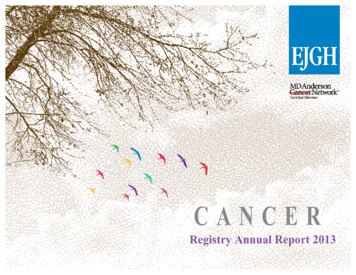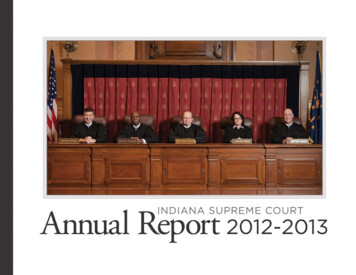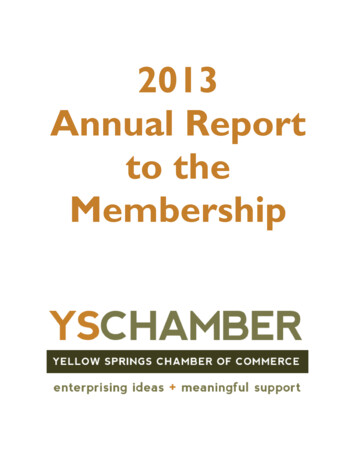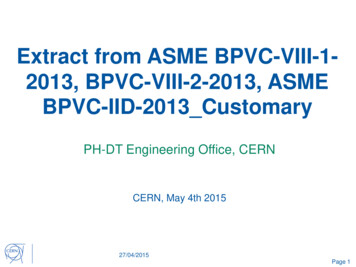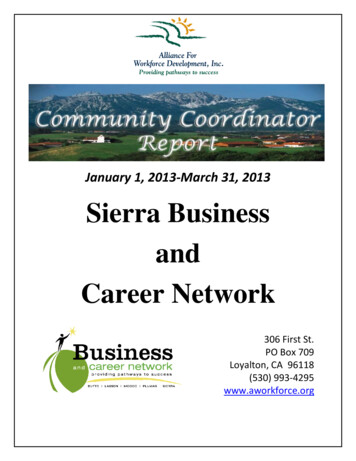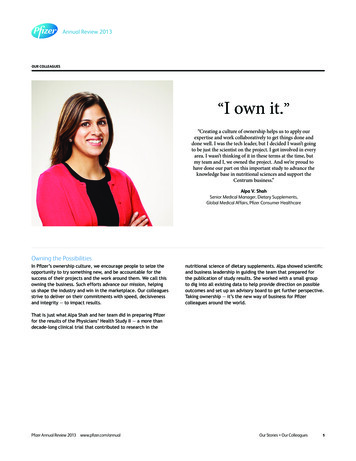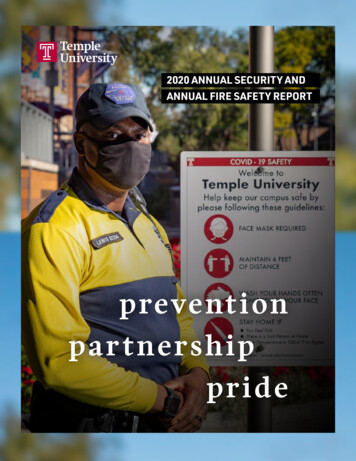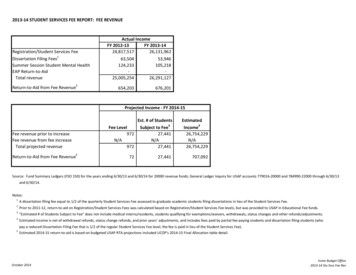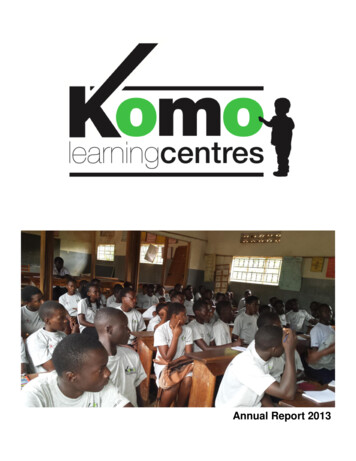
Transcription
Annual Report 2013
WHO WE AREAND HOW WEDO ITThe Komo Learning Centres (KLC) is a US based Non Profit Organization (501c3) that wasestablished in 2008 to provide community based educational opportunities for vulnerable &disadvantaged children in the Nama Sub county in Uganda. Since then, we have beenworking through our implementing partner, Mpoma Community HIV/AIDS Initiative, createdby HIV positive parents who wanted a better future for their kids.We partner with communities to provide quality education, health care, access to cleanwater, agriculture/food security training, and livelihood opportunities for youth. We engage anetwork of partners both locally and abroad who provide us with technical expertise.Our objective is to create sustainable community development with an exit strategy so thatwe may move onto additional communities facing developmental challenges. We believethat the only way to develop a community sustainably is through a holistic approach. Wepredominantly focus on the youth (defined as under the age of 25) in order to build them abright future where they will be in a position to provide for their own families, and haveeducation, food and health care.2
LETTER FROM OUR FOUNDERSDear Friends and Supporters,2013 has been a critical year for Komo Learning Centres— a year of growth, expansionand transition. We not only continue to support our local partner (Mpoma HIV/AIDSCommunity Initiative), but we are also launching new initiatives through our own newlyformed local NGO, KLC Uganda, led by our new Country Director Holly DeYoung.We have also made a strategic decision to put more emphasis on our youth throughout allour programs.In the field of Education, we continue to support the Johnson Primary School, and we alsosponsor almost 100 secondary, vocational, and university students. More importantly, wehave now launched a youth job training initiative and recruited 140 young adults whom wewill train and mentor in order to enable them to create self-employment or find employmentopportunities. If successful, this pilot will be scaled up next year!In the field of health, we continue to conduct our outreaches mainly for malaria, HIV testing,and family planning. We have started a youth outreach initiative and are trying to establishyouth corners in the rural communities. We are also almost finished building a brand newhealth center that will be its own NGO, managed 100% by Ugandans, and that will servethe local community with a big emphasis on the youth in the area of reproductive health.It is our firm belief that our comprehensive holistic approach will help change thecommunity landscape in the long run in a sustainable way and is the only way to offer abright future to this young generation of Ugandans.For the longer term, we are already thinking of ways to ensure that our local NGO will havea way to sustain itself a few years from now and generate revenues to fund its ownprograms directly.As always, we thank you for your support and generosity that enable us to make adifference in these young people’s lives.3
4WHERE WE WORK:
EDUCATIONEducating Orphans and Vulnerable Children We believe that every child has a right to go to school, so we select our kidsbased on needs and not merit We provide for their tuition, uniforms, school supplies, healthcare,necessities, and tutoring when needed; for most, we sponsor them asboarders so they have the best chance to be successful. We meet regularly with the parents/guardians We mentor them and organize camps during holidays We closely follow their performances at school so they take the right path fortheir education according to their skillsJohnson Nkosi PrimarySchoolWe are its main partner andfinancial contributor 320 kids enrolled 70% food securityachieved Food commercializationinitiative started togenerate additionalrevenues so that theschool is closer toachieving financialstabilitySponsorships 1 primary 68 secondary (24 newstudents will be added in2014 9 vocational studentsengaged in engineering,catering, plumbing,agriculture and mechanics 12 university studentsstudying medicine, masscommunication, procurementand logistics, social work,administration, accountingand financial managementYouth Peer ProviderProgram (YPP) We sponsored three youthcamps in 2013 for oursecondary schoolsponsored students.Session topics includeddiscipline, personalresponsibility, improvingschool performance, sexualand reproductive health,importance ofperseverance, the impact ofearly relationships, life skillsand leadership training aswell as counseling.5
YOUTHLIVELIHOODSAND TRAININGUganda has a very young population witharound 70% under the age of 30. With anaverage population growth rate of 3.2%, thereis a large challenge for the labor market toabsorb the youth. Increasing employmentrates and a reduction of poverty of this agebracket is a high priority for the government ofUganda. Roughly 32% of the youth aged 1830 in Uganda are unemployed, and anadditional 30% are underemployed; roughly50% of economically active youth are notengaged in income generating employment.The government of Uganda has identified jobcreation through non-formal skillsdevelopment and business start-ups as amajor strategy to combat the youthemployment challenge. With many youthundereducated and not equipped with basiclife skills, specific interventions need to bedesigned to target these youth to teach skills,create employment opportunities and thusimprove livelihoods for this large vulnerablepopulation.To help combat this challenge, through apartnership with a local organization M.C.E,KLC has launched a pilot initiative calledLeadership, Entrepreneurship, andApprenticeship Program (LEAP).6LEAP has been designed to prepare out ofschool youth in Nama Subcounty for aproductive communiity life with the objectiveto attain employment over an 18 monthtraining and mentorship course focusing on: Leadership skill developmentEntrepreneurship skill developmentMarketable skill development throughappreticeshipPost program support that includescontinued mentorship and access toopportunities such as financing andlinkagesWhat we will measure: Improved youth livelihoodsIncreased marketable vocational oremployment ability skillsIncreased small business creationIncrease youth incomesIncreased community participation andleadership
LivelihoodAchievementsin 2013: Recruitment andtraining of our staffmembers Design of the trainingmodules Recruitment of 140Youth between theages of 15 – 25 Youth orientation CommunityStakeholders meetingand networking Looking aheadat 2014:The major focus for 2014will be orienting the youth,conducting home visits,launching the programofficially in the community,mapping the communityfor apprenticeshipopportunities, andensuring that youth startinnovative enterprises orfind employment.7
HEALTHIn Uganda, acute lower respiratory illness, malaria, premature birth, diarrheal disease, birthasphyxia, and HIV/AIDS account for 80% of all under-five deaths. Many of these illnesses areconfounded by poor nutritional status of mothers and children and early motherhood. One in fourchildren in Uganda are born to females under the age of 19. The result is a rapidly growingpopulation that is expected to exceed 54 million by 2025 and, if uncurbed, 103 million by 2050.The youth bulge will put additional pressure on an already underperforming health systemcharacterized by lack of access (especially to rural populations and pregnant women),overcrowding, understaffing, under-skilled, and undersupplied healthcare facilities.Under 5 Cause Specific Mortality (%)Uganda, 2010Birth Asphyxia9%Premature14%Other19%HIV/AIDS8%World Bank DataIn 2013, to combat this complex burden ofhealth, KLC continued financial support ofhealth outreaches with partner MpomaHIV/AIDS Community Initiative, trained youthpeer counselors to address the sexual andreproductive health of youth includingdiscussions on family planning, STIs andsexuality. We also began building the NamaWellness Community Center, which will includeboth a health clinic and a youth specific centerhoused in separate njury6%Measels Diarrhea0%11%
Health OutreachOur partner MpomaHIV/AIDS CommunityInitiative health workersconducted HIV/AIDStesting and counseling,malaria prevention andcontrol, deworming andfamily planningoutreaches in 38villages.HIV/AIDS TESTING AND COUNSELINGAfter having thought that the HIV/AIDS epidemic had stabilized at about 6% in 2005,prevalence rates are increasing and currently stand at 7% nationally, disproportionallyaffecting women. The new incidence trend has changed demographics and populationstudies have revealed a gap between awareness and safe practice behavior.In 2013, Partners Mpoma HIV/AIDS Community Initiative and Kyetume Health Clinictested 2052 people for HIV in Nama Sub County. 35 males tested positive out of 916 and43 females tested positive out of 1136.FAMILY PLANNING 803 total clients were reached629 injections of Depo Provera were given174 packages of oral contraceptives were given (three months per package)15930 condoms were given outDEWORMING3889 deworming pills were given to children and 622 were given to adults.MALARIA PREVENTION AND CONTROL100 homes were reached earlier in the year when follow up visits were conducted afterhouseholds purchased nets.In the second half of 2013 the government of Uganda instituted a free net distributionprogram that impacted the number of households purchasing nets.9
Total343482Males Females168175212270Skin 2964253311349CellulitisHIV TonsillitisMeaslesVaginal Candida3114233725181631537AllergyRing worms10148356792111(323)1Influenza H1421626Chicken Pox835Ear InfectionTotal visits11,2725341738ReferralsMumpsWoundsSchool Students161511WATER, SANITATION AND HYGIENE (WASH)PROGRAMTogether with our local implementing partner, we value the roles communities play in promotingincreased access to clean and safe water in households. Our WASH program resulted inincreased awareness, responsibilities, and community participation in efforts to reduce unsafewater for domestic use in households.At the community level, Mpoma team carried out a range of activities, community meetings, anddialogs for building and strengthening structures for the protection, maintenance, and repairs ofwater sources.Indirectly, the program supports children, HIV positive people, the elderly, and the generalcommunity to enjoy clean and safe water to respect the minimal standard required by thegovernment.10
Impact of WASHprogram 5 water sources were constructed in 5villages (Lukalu, Kyimbuguma, Waluga,Lukojjo and Mpoma, Waluga andKiwana)5 water-user committees were createdby the end of the yearApproximately 1500 – 1800 people haveincreased access to clean and safewaterThe project contributed towardsgovernment efforts of supporting itspeople to enjoy increased accessibility ofwater. In Uganda, 65% of people haveaccess to improved drinking waterAn increase of community participationand awareness of WASH and on how totake good care of water sources so theylast longerWater-user committees are responsiblefor mobilizing other members to ensurethe water sources site is kept cleanWater containers are washed regularly toavoid contaminated waterMemorandum of Understanding betweenMpoma and GlobeMed UCLA was madeto expand WASH activities to eightadditional villages in 2014.Nama Wellness HealthCenterWe have started to build the new communityclinic and are scheduling its opening for April2014. It will first focus on primary health careas well as serving as headquarters forcontinuing community health outreaches for: Malaria prevention and treatmentFamily planning and maternal healthHIV/AIDS testing and educationWater, sanitation and hygieneIn addition, the health center plans to providespecialty services such as dental exams,cervical cancer screenings, and a separateyouth-only sexual and reproductive healthservice area.This clinic will be a stand-alone NGO, staffedonly with Ugandans, initially funded by KLCUganda.11
FOOD SECURITY AND AGRICULTUREJohnson Nkosi Primary SchoolKLC has been financially supporting Johnson Nkosi Memorial Primary School since 2008,covering deficits in operating costs. One important effort is to subsidize operating costsof the production of the school’s own food, and eventually hopefully also provide anincome generation for the school through the sale of surplus crops. To achieve this goal,KLC purchased 10 acres of land to farm. 2013 saw the following successes:CommercializationFood SecurityThere was 70% overall Food securityachieved at the Johnson Nkosi PrimarySchool in 2013. For the two main foodsconsumed by our students (posho andbeans) we are now 100% food secure. 12Continued with production ofvegetables, beans, matooke andfruits such as papaya, jackfruit andmango provide added nutrition toschool meals.Vegetable trials: increased thevariety of the vegetables in thestudents’ meals through planting adiversity of vegetables withincreased nutrient content includingcarrots, pumpkins, tomatoes andsweet potatoes New irrigation system for the landpurchased by KLC in Busale Optimization of space forcommercialization achievedthanks to intercropping matookewith cabbages, green peppers,watermelons and pumpkins Significant revenues should begenerated starting mid 2014 thatwill help Johnson Nkosi schoolget closer to financialsustainability.
Community FarmersAfter training 100 plus farmers in 2012,we have been looking for the best way toprovide these farmers access to markets Created a detailed community farmerassessment to determine the status offarmers in the 5 community farmergroups established some years ago byMpomaThe main objective of theseassessments was to follow up on theloans given by Mpoma 3 years agomainly in the form of matooke tissueloans, with a few in the form of directcash loansA secondary objective was todetermine the general status of thecommunity farmers, what knowledgethey have gained from Mpomaworkshops in the past, the challengesthey currently face, their needs, andways in which Mpoma could contributeto help them improve their situationsthrough workshops anddemonstrations as we have done inthe past.The results of this analysis will beanalyzed to determine the best way tomove forwards with our farmercommunity.Student Challenge Gardens70% of Ugandans engage in agricultureon some level. Many households inMukono Uganda do not have a large plotof land to farm and are undernourished.Additionally, techniques do notnecessarily encourage optimal use ofsoil, affecting yields. In order to generateinterest in farming, encourage propernutrition and to demonstrate that akitchen garden can be planted even inthe smallest of spaces, KLC beganconsulting with the Slow FoodOrganization which is responsible for the1000 Gardens in Africa project acrossEast Africa.Following a suggestion from the SlowFood Organization, the students atJohnson Nkosi were given their own bedsso each class could grow their own cropof choice. In order to ensure that theseeds they planted germinated, thestudents learned to re-use used waterand soda bottles, which would otherwisebe trashed, as seed-starter plots.Each class will compete against eachother to produce the highest yields in theprocess learning about organic growingpractices, nutrition and entrepreneurship.Hopefully these same gardens will beginto appear at their households, sharing theeducation with families.13
Komo Learning Centres 2013FinancialsIncomeFoundations/NGOsIndividual l Income327,388.29ExpensesNkosi School/Mpoma CommunityEducation SponsorshipsClinic (building)KLC Uganda OperationsYouth Livelihood ProgramExpenses (US)Bank 1,923.58930.00Total Expenses291,077.58Net Change to Cash36,310.71NB 100% of all donations we receive are spent on operations in UgandaProgram Breakdown:14Education41%Food Security2%Health30%Livelihoods15%Operations Cost12%
ONE CHILD ATA TIMESome of you may remember that I got reunited last December with Nanteza whom Ihad lost track of for five years.I found out last summer during dinner with her that she could not bend her left arm.She had broken her arm at a young age, and it had not healed properly (she nevergot to see a doctor, which is nothing unusual in Uganda), affecting her growth andthe normal motion of her arm. We arranged to take her in for orthopedic surgery atthe SAS clinic in Kampala in November during her school break. She is nowexpected to make a full recovery, and can, a month later, bend her arm and carry a10-liter jerry can while smiling :)KLC sponsors and mentors a lot of youngsters, but more importantly cares for themas if they were our own children, one child at a time.
The Komo Learning Centres (KLC) is a US based Non Profit Organization (501c3) that was established in 2008 to provide community based educational opportunities for vulnerable & disadvantaged children in the Nama Sub county in Uganda. Since then, we have been working through our implement

